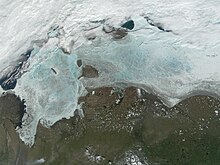Great Siberian Polynya

The Great Siberian Polynya (Russian: Великая Сибирская полынья) is a strip of open water and young ice that regularly forms beyond the outer edge of the fast ice in the area from Bolshoy Begichev Island in the Laptev Sea to the Medvezhyi Islands in the East Siberian Sea. This strip of open water is also often referred to as the Siberian Polynya. In some years, the polynya significantly decreases and two relatively independent areas of open water and young ice form - the Lena and Novosibirsk polynyas.[1]
History of discovery
[edit]The first information about the existence of the polynya was obtained in the 18th century. As early as 1736, Lomonosov wrote in his “Brief Description of Various Voyages in the Northern Seas and an Indication of a Possible Passage through the Siberian Ocean to East India,” based on historical documents and information received from the Pomors, “at a distance of five and seven hundred miles from the Siberian shores, the Siberian Ocean in the summer months is free of such ice that would impede ship travel.” He gave a classic description of the Great Siberian Polynya.[2]
Economic use
[edit]Large areas of water free of pack ice are used for navigation and facilitate the development of shipping in the Laptev Sea, the East Siberian Sea and other sections of the Northern Sea Route.
See also
[edit]References
[edit]- ^ Гуков А.Ю. (2009). "Великая Сибирская полынья, век XXI" (PDF) (in Russian) (1 (16)). Archived from the original (PDF) on 2022-03-14.
{{cite journal}}: Cite journal requires|journal=(help)CS1 maint: date and year (link) - ^ Колчак А.В. (1909). Записки Российской Академии наук (ed.). "Лёд Карского и Сибирского морей" (VIII серия) (in Russian). XXVI (Научные результаты Русской полярной экспедиции 1900-1903 гг под начальством Э. В. Толля ed.). СПб: 26–58.
{{cite journal}}: Cite journal requires|journal=(help)CS1 maint: date and year (link)


 French
French Deutsch
Deutsch